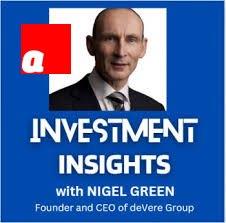
Investors Eye The Gulf As US Visa Hikes Reshape Global Talent Map
Washington's plan to sharply raise the cost of H-1B visas-the key route for skilled overseas professionals into the United States-has consequences far beyond immigration policy.
It signals a potential reallocation of talent, capital and innovation that could redefine where the next wave of technology growth takes place.
If the US prices out the world's top engineers, data scientists and entrepreneurs, those individuals will gravitate toward regions offering a clearer path to opportunity.
Few are better positioned to capture that flow than the Gulf states, which have spent years preparing to become a global technology powerhouse. For investors searching for growth markets, this could be a pivotal development.
The United Arab Emirates and Saudi Arabia have already committed billions to artificial intelligence, cloud computing and advanced research. These investments are part of long-term national strategies designed to diversify their economies beyond hydrocarbons.
They're not merely writing cheques; they are building entire ecosystems, including research parks, digital infrastructure and venture networks, which can absorb the world's brightest minds and transform their ideas into scalable businesses.
Rising US visa fees effectively increase the cost of doing business for American technology firms, pushing talent and, eventually, capital toward alternative hubs.
Investors who want exposure to the next wave of AI breakthroughs or fintech innovation should note that the Gulf is offering not just competitive pay for specialists but a regulatory and fiscal environment that supports rapid growth. Low personal tax rates, streamlined business licensing and long-term residency permits give entrepreneurs and highly skilled professionals the confidence to settle and build.
The Middle East's appeal goes beyond lifestyle benefits. By attracting a critical mass of technologists, the region sets off a chain reaction: venture capital follows talent, multinational firms establish regional operations and ancillary industries, such as education, healthcare, consumer services, expand to meet new demand.
Each link in this chain represents opportunities for equity investors, private equity funds and strategic corporates.
Saudi Arabia's large-scale development projects, backed by one of the world's deepest sovereign wealth funds, illustrate the scope. These initiatives are designed to be magnets for next-generation industries, from robotics to renewable energy. As global technology leaders set up in these new cities, early investors gain access to ground-floor opportunities in markets that are still underrepresented in global portfolios.
For venture investors, the message is equally compelling. Start-ups founded or relocated in the Gulf will benefit from generous funding pools, a supportive regulatory climate and ready access to global markets across Asia, Europe and Africa. That combination shortens the path from prototype to commercial success.
The competitive advantage is reinforced by immigration policy. While some Western economies tighten restrictions or add bureaucracy, the Gulf offers multi-year residency options and renewable“golden” visas for highly skilled individuals and their families. This stability is a powerful lure for innovators who might otherwise face years of uncertainty in the United States or parts of Europe.
From an asset-allocation perspective, investors should evaluate the region's growing technology clusters alongside established centres like Silicon Valley, Shenzhen and Bangalore.
The Gulf is unlikely to displace those hubs overnight, but its momentum is undeniable. Public listings, private placements and cross-border joint ventures are all likely to increase as capital flows chase the talent influx.
This shift also provides diversification benefits. Technology projects in the Gulf are supported by government-backed funding and long-term strategic plans that are less sensitive to electoral cycles and policy swings that can disrupt Western markets.
For institutional investors seeking stable, policy-driven growth, this can be an attractive counterweight to more volatile geographies.
Higher US visa fees may create an unintended transfer of human capital and innovation to the Middle East. Investors who recognise this trend early will be better positioned to capture value as the Gulf consolidates its role as a global hub for advanced technology.
The key is to look beyond today's headlines and position portfolios for a future in which Dubai, Abu Dhabi and Riyadh sit alongside Silicon Valley and Singapore as centres of world-class innovation.
Nigel Green is deVere CEO and Founder
Also published on Medium .
Notice an issue? Arabian Post strives to deliver the most accurate and reliable information to its readers. If you believe you have identified an error or inconsistency in this article, please don't hesitate to contact our editorial team at editor[at]thearabianpost[dot]com . We are committed to promptly addressing any concerns and ensuring the highest level of journalistic integrity.
Legal Disclaimer:
MENAFN provides the
information “as is” without warranty of any kind. We do not accept
any responsibility or liability for the accuracy, content, images,
videos, licenses, completeness, legality, or reliability of the information
contained in this article. If you have any complaints or copyright
issues related to this article, kindly contact the provider above.


















Comments
No comment